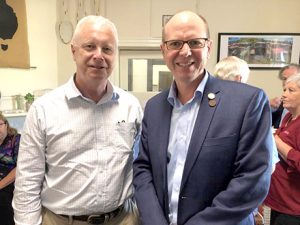Key forestry assets such as the NSW Southwest Slopes’ softwood plantations, which support the biggest economic sector in the region, should be considered critical infrastructure when allocating firefighting and fire mitigation resources, the Royal Commission into Natural Disaster Arrangements has been told. Source: Timberbiz
The Australian Forest Products Association told the Royal Commission’s Chair Air Chief Marshal Mark Binskin on Friday at a community forum in Tumbarumba that there must be a whole-of-landscape approach to bushfire mitigation and land management, and more aggressive fuel reduction that includes mechanical fuel reduction alongside controlled burns.
“The current system where there are multiple approaches to fuel reduction by multiple land managers and agencies isn’t working and we need a more coordinated approach,” AFPA CEO Ross Hampton said.
“I commend the Federal Government for including in the terms of reference for the Royal Commission “the preparedness and resilience responsibilities, which includes land management and hazard reduction measures’, which gives the Commissioners the scope to closely examine this issue.”
Mr Hampton said that while bushfires were unavoidable, more fuel reduction that included mechanical fuel reduction to create buffers around towns and critical infrastructure would make it easier to suppress catastrophic fires.
“The softwood plantation-based industry is the biggest employer in this region, supporting nearly $2 billion of economic activity in the region and employs around 5000 people, but with up to 40% of region’s softwood estate damaged by the fires there will be a significant impact on the industry for at least the next 15 years,” Mr Hampton said.
“While saving lives must be the priority for firefighting resources, we must also redefine critical infrastructure to include key economic assets such as forestry plantations because they are the economic backbone of many regional communities, and they can take decades to recover. This should apply not just to the deployment of fire mitigation and suppression resources, but also recovery funding.”
Mr Hampton welcomed the NSW Government’s announcement this week of a $46 million equity injection into Forestry Corporation of NSW is a welcome first step to aid the state’s forest industries recovery from the bushfires.
“The replanting effort, the recovery of burnt timber and the increased freight costs facing the industry are significant and we are working with the NSW and Federal Governments to manage these challenges – we hope to see further announcements to support the massive recovery effort needed in NSW, Victoria and South Australia,” Mr Hampton said.






